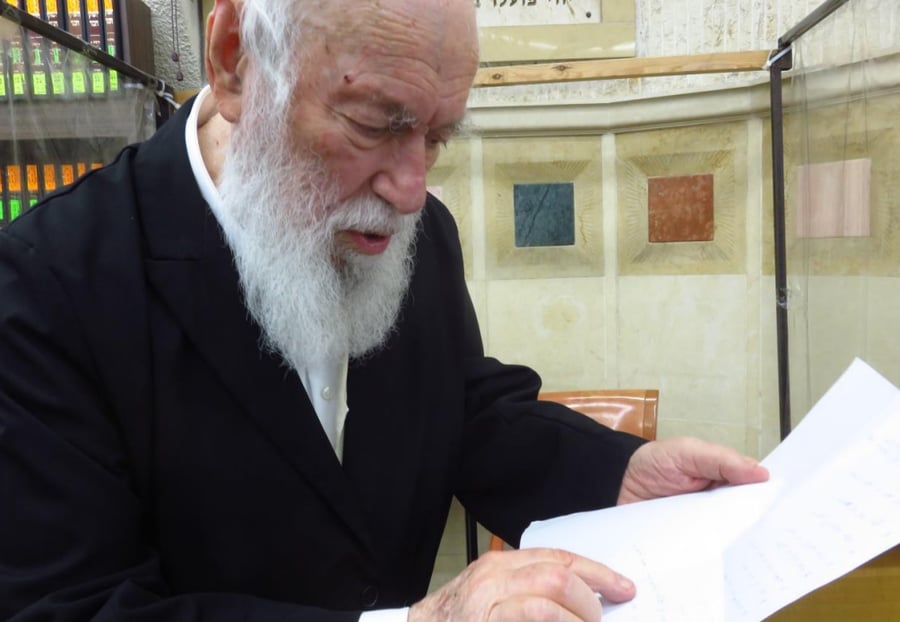And the children clashed within her (Bereishis 25:22).
Whenever she passed the entrances to the House of Study of Ever, Yaakov struggled to exit, [whenever] she passed the entrance to houses of idol worship, Esav struggled to exit (Rash) to Bereishis 25:22).
The Midrash cited by Rashi requires much study, for it seems to imply that Esav and Yaakov were already fixed in their tendencies to evil and righteousness, respectively, prior to birth. That would seem to contradict the very foundation of Torah: the principle of free will.
The Midrash also seems to contradict another Chazal. The Talmud (Sanhedrin 91b) relates that Rebbe, the descendant of Yaakov, and Antoninus, the descendant of Esav, debated when the yetzer hara enters a person. Rebbe maintained that it enters at conception and Antoninus maintained that it enters at birth. After Antoninus brought Scriptural proof to bolster his opinion, Rebbe acquiesced that it enters only at birth. Yet the Midrash, cited above, seems to attribute a yetzer hara to Esav prior to birth.
Rambam begins Hilchos De’os with a discussion of in-born personality traits and predispositions. For instance, he writes, some people are by nature cruel and others merciful. Yet Rambam in the fifth chapter of Hilchos Teshuvah is emphatic that a person’s nature does not cause him to be righteous or evil, merciful or cruel, wise or foolish, generous or stingy. The choice lies completely in his own hands. Aside from the apparent contradiction with Hilchos De’os, this statement is problematic for another reason. The assertion that wisdom or foolishness is not decreed seems to contradict the Gemara (Niddah 16b), which states clearly that wealth, strength, and intelligence are decreed at conception. Only whether one will be righteous or wicked is not decreed.
Resolution of the problem of in-born traits with individual free will is based on the following premise: While no two people are born with the same exact character traits, and those traits are influenced by many factors – including spiritual forces both prior to and at conception – these traits are not inherently good or bad. They are pareve. A predilection towards anger, for instance, is not necessarily an evil trait. There are situations when anger is required and is the correct response. Similarly, all natural traits and tendencies can be directed in both positive and negative directions. The tendency to shed blood, for instance, can be utilized as a shochet, a mohel, or surgeon, or it can be directed towards crime and murder. Although the character traits are predetermined, their function and control are totally in the hands of the individual. He exercises his free will in utilizing them for good or bad, and suppressing these tendencies when necessary.
Wisdom and intelligence are two distinct realms. One can have the IQ of a genius and act like a fool, and one can lack a high IQ and yet act with wisdom. Although intelligence is largely predetermined, as the Talmud states, whether one acts wisely or foolishly is, as Rambam writes, a function of one’s free will.
There is, however, one point that still needs to be clarified. While it is true that no single character trait or tendency is intrinsically good or bad, there are nevertheless certain traits that are more conducive to righteous conduct and those more prone to evil. A tendency towards anger, for example, is more prone to be abused, since there are more instances where anger is negative than where it is positive. By contrast, a natural tendency towards calmness is more prone to lead one to righteous conduct, since there are more instances where this behavior is positive than not.
Thus the difference in natural tendencies might seem to contain an element of injustice. But three points must be kept in mind. First, every person embodies a myriad of character traits. Though someone may be born with a trait that is predominantly negative, he will almost certainly have other traits that are predominantly positive.
Secondly, Hashem takes into consideration one’s predispositions in determining the situations he will be confronted with in life. Finally, as the Vilna Gaon states, Hashem judges each individual in relation to his specific nature. Hence, a person prone to anger by nature will be judged less harshly if he succumbs to a fit of anger than a person who is by nature calm. Likewise, a person with a predisposition to anger will receive more reward for controlling his anger than a person with a calm disposition.
Considered in this light, the Midrash is not telling us that Yaakov and Esav were acting in a good or evil fashion prior to birth. Rather they displayed tendencies towards either the more spiritual aspects of this world or the more physical. The houses of Torah study represented the epitome of spirituality and those of idolatry the epitome of physicality (idol worship being the deification of physical forces).
Esav and Yaakov ideally represented the partnership necessary to bring this world to perfection-the mastery and perfection of the physical world as a basis for spiritual perfection. Klal Yisrael would need both the Tribe of Yehudah, from whom the kings came and whose role was to master the world and conquer the forces of evil, and the Tribe of Levi from whom the Kohen Gadol came and whose role was to provide spiritual guidance and inspiration.
Chazal tell us that Yaakov and Esav divided Olam Hazeh (this world) and Olam Haba (the World to Come) between themselves; Esav taking the former and Yaakov the latter. This does not mean that Esav divested himself of a share in Olam Haba before birth, but rather that these two embryos had the ultimate potential to control the physical world and the spiritual world respectively. Had Esav used his traits and tendencies properly, he could have become a partner with Yaakov in bringing the world to perfection. Similarly, had Yaakov abused his traits, he could have developed into one who distorted and corrupted spiritual concepts and values.
The example of what the partnership of Yaakov and Esav could have been was epitomized by their descendants Antoninus-the might of Rome conquering the physical world-and Rebbe-the spirituality of Israel directing it toward spiritual values and goals. Nowhere does it state that Esav wanted to serve idolatry, only that he had a tendency towards it; he was just as capable of destroying idolatry and vanquishing the idolaters, as serving and promoting it. His mother Rivkah, says the Sifsei Kohen, deliberately passed by these places of idolatry in order to influence the heathens to renounce their idolatry.
Now we can understand why Yitzchak wanted to give Esav the berachah, and loved Esav the hunter more than Yaakov, the diligent student. Esav deceived Yitzchak into thinking that he could employ his tendencies towards the physical world to conquer the world for Torah and subdue the forces of evil. Yitzchak attributed the differences he noted in Esav’s and Yaakov’s behavior-the fact that Esav did not mention God’s name and acted without proper courtesy -to Esav’s role as the mighty warrior who spoke with force and not finesse. He assumed that Esav was afraid to mention God’s name out of fear that he might forget himself in places to which his mission in life would inevitably bring him where mentioning God’s name is prohibited.
Yitzchak thought that Esav was utilizing his unique traits for the good. True, in less than sublime ways, but that is the role of a king, who has to engage in war and to meet evil head-on to maintain justice in the world. Therefore Yitzchak desired to give the blessings, which were all material in nature, to Esav, who would need them to fulfill his role. Yaakov, he felt, did not need those blessings in the safe confines of the tents of learning.
Only Rivkah saw through the righteous facade of Esav and recognized his deceptive ways-in part because of her familiarity with her own family of frauds and charlatans. She alone was able to expose Esav for what he really was and cause Yitzchak to see that both roles would be the domain of Yaakov-that Yaakov would be the sole progenitor of the future Klal Yisroel. Esav had exercised his free will to channel his tendencies toward evil, thereby disqualifying himself from a position in the future nation.
Toldos should serve as an incentive to us to delve into our own personalities, to better understand our natural tendencies, so that we can develop and channel our unique traits to their most sublime purpose: the perfection of the world through the promotion of Torah and Divine service.










